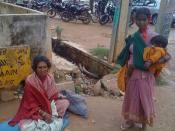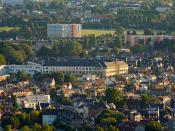Absolute poverty can be defined as a severe deprivation of basic human needs, such as food, safe drinking water, clothing, and shelter. Someone who is considered to be in absolute poverty has the minimum level of income to be able to barely satisfy the needs of basic human survival. A good example of someone living in absolute poverty is someone living in a makeshift community such as a slum or shanty-town. Relative poverty is being below some relative poverty threshold, such as a "poverty line." An example of relative poverty is when poverty is defined as households who earn less than 45% of the average income. As far as relative poverty goes, if everyone's income in an economy increases, but the income distribution stays the same, relative poverty will also stay the same.
Economic growth can lead to reduction of poverty, and reduction of poverty can lead to economic growth.
They are complementary to each other. For example, a growing nation will be able to increase production of the poor, which, in-turn can create more equitable distribution for the nation. This also works the other way around; a more equitable distribution can lead to increased production of the poor, which can lead to higher growth. Raising the income of the poor can enhance their ability to produce (Access to credit, education, etc). Raising the income of the poor also widens the domestic market and may lead to the diversification of the economy. A wider participation in the economy enhances economic growth and developmentThe rapid rate of urbanization in the developing countries is a problem. In an urbanizing nation, urban populations begin to grow very rapidly. There is natural growth and rural-urban migration. Rural-urban migration occurs because people want to move to the urban cities for more jobs than a...


